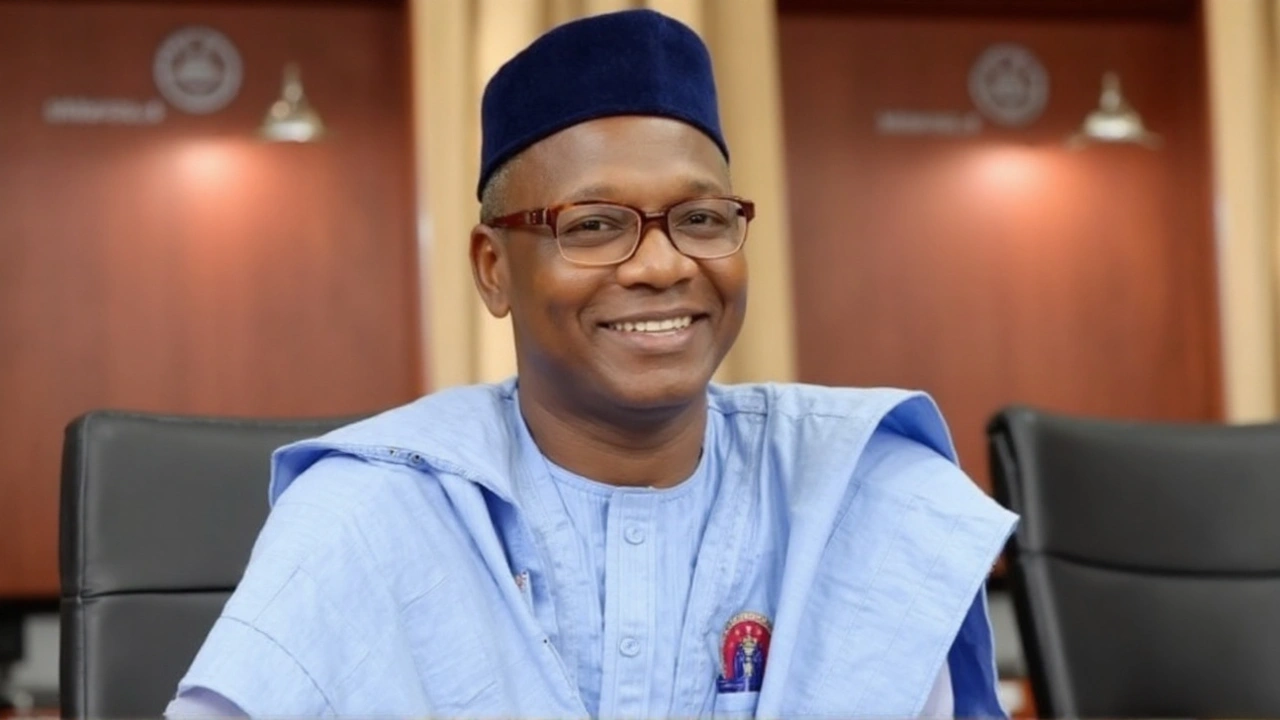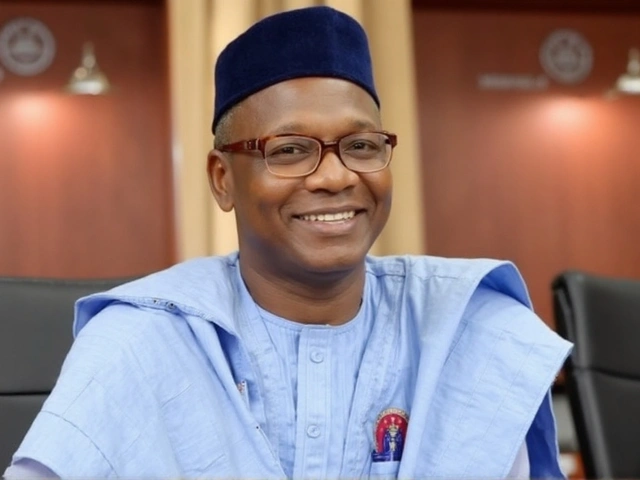A fresh political fight is erupting in Kaduna. The African Democratic Congress says there is a plan to arrest former Kaduna State governor El-Rufai after police summoned him and six party figures over alleged criminal conspiracy, incitement, mischief, and causing grievous hurt. The letter, dated September 4, 2025, and signed by Deputy Commissioner of Police Uzairu Abdullahi of the State Criminal Investigation Department, ordered them to appear on September 8.
The invitation lists several high-profile names tied to the former governor. The letter also directs the ADC state chairman to produce all the invitees. Opposition leaders, including former Vice President Atiku Abubakar, say the move looks like a political squeeze designed to silence rivals amid rising tension in the state.
The summons lands at a sensitive moment. Kaduna is still on edge after a weekend clash where thugs armed with cutlasses, clubs, and stones stormed an ADC event meant to inaugurate a transition committee. The attack injured several people and damaged property. Instead of de-escalating, the week only got hotter: police sealed the ADC office, citing a court order. Party leaders say they were never given any document, and that neither the order nor proper service was presented.
How Kaduna got here: a meeting, a brawl, and a sealed office
According to ADC officials, their meeting last Saturday was a routine party exercise until it was cut short by a coordinated assault. Members described attackers arriving in groups, targeting party leaders, and scattering the crowd. The party’s claim is simple: this wasn’t a spontaneous scuffle; it was meant to break up the gathering and intimidate the opposition.
Police later shut the party office. Officers on the scene told ADC figures there was a court directive to bar the meeting. ADC leaders and the former governor pushed back, saying no one served them any order and none was shown to them on site. They argue the right response would have been to protect citizens from violence, not to shut down a legal political meeting.
From there, the dispute moved to the courts—at least in planning. The former governor, flanked by party leaders, said they will challenge the shutdown and the handling of the attack. He signaled a long legal fight that could travel through multiple courts if needed. Senior party figures went further, warning that Kaduna risks slipping into a climate where force, not law, decides who gets to assemble and speak.
This clash also comes after a bruising stretch of by-elections in which allies of the former governor took losses. Those defeats stoked talk of realignments and raised the stakes for every local skirmish. When the violence broke out and the office was sealed, the fight took on a larger meaning: who holds the political space in Kaduna—and under what rules.
Below are the individuals named in the police letter to appear before the State CID on September 8:
- Former Governor Nasir El-Rufai
- Bashir Sa’idu, former Chief of Staff
- Jafaru Sani
- Ubaidullah Mohammed
- Nasiru Maikano
- Aminu Abita
- Ahmed Hussaini (also known as Mikiya)
Party officials say the timing of the summons, days after the assault and the sealing of their office, makes the process look less like neutral law enforcement and more like political pressure. They insist they will attend any lawful invitation but will not accept what they call selective enforcement. The police, beyond the summons letter, have yet to hold a public briefing addressing the attack on the ADC event or the sealing of the office with documentary proof of the order cited.

The charges, the process, and what happens next
The letter cites four offences: criminal conspiracy, incitement of public disturbance, mischief, and causing grievous hurt. In plain terms, the police are looking at whether the named individuals planned or encouraged unrest and whether property damage and injuries can be tied to them. In practice, a summons means they must show up, answer questions, and possibly submit statements. It does not, by itself, equal an arrest. Arrest follows only if investigators believe there is cause to detain or charge.
ADC leaders say the allegations are upside down: the party was the victim of violence, not the instigator. They argue that if the police want to investigate, they should first identify and arrest the armed thugs who broke up the gathering. Their legal team is preparing to challenge both the sealing of the party office and any attempt to detain their leaders without clear evidence.
The flashpoint is due process. If a court genuinely barred the meeting, the order should have been served on the party and enforced through lawful steps. If no order exists—or if it was not properly served—then shutting the office or stopping the meeting would be hard to defend in court. That is the case the ADC wants to test.
Another sticking point is communication. Many in the party say they first heard of the summons on social media, not through formal delivery. That undercuts confidence in the process and feeds claims of a heavy-handed approach. In politically tense environments, procedure matters. Getting the basics wrong—service of orders, clear notices, public briefings—can make a routine investigation look like a crackdown.
Atiku Abubakar and other opposition figures are not mincing words. They call this a targeted campaign to sideline a major political figure and weaken a rival bloc in the state. The former vice president’s intervention lifts the matter from a local dispute to one with national attention, adding pressure on the police and the federal government to show that the investigation is anchored in law and not politics.
ADC chieftain Lawal Batagarawa described the weekend attack as coordinated and warned that normalizing violence at political meetings is a road to authoritarian habits. His point resonates beyond Kaduna: if parties can’t meet without fear, the entire democratic process frays. It is a warning shot to authorities to protect peaceful assembly, not manage it by force.
Even by Kaduna’s rough-and-tumble standards, this standoff is unusual. A former governor is at the center of a criminal inquiry while his allies recover from a violent disruption. The state government, led by Governor Uba Sani, is not officially part of the police action, but the political context is unavoidable. There has been a very public rift between the two men’s camps, amplified by the recent voting setbacks for the former governor’s allies.
Here’s the likely short-term path:
- September 8 appearance: The named individuals appear at the State CID. They are questioned and asked to make statements. Lawyers are likely to attend.
- Possible detention or release: Investigators decide whether to keep anyone for further questioning. Administrative bail is possible if detention is considered.
- Evidence review: Police assess statements, reports from the disrupted meeting, injury records, and any footage or eyewitness accounts.
- Charging decision: If evidence supports it, the police may seek to charge in court. Otherwise, they may continue inquiries or drop certain lines of investigation.
- Court challenges: ADC’s legal moves against the office closure and enforcement tactics could start in parallel, potentially leading to injunctions.
Two questions hang over all of this. First, will the police present the supposed court order and a clear account of why the office was sealed? Second, will there be arrests of the attackers who stormed the ADC venue? Straight answers to both would go a long way in restoring trust.
The stakes are bigger than any single party. Opposition spaces are often messy—loud, factional, and prone to dispute—but they are part of the democratic machinery. If violence and opaque policing become the norm, people lose faith fast. Kaduna has seen enough upheaval in the past to know how quickly trust can collapse.
For now, the former governor’s camp is preparing for a legal grind. They say they will attend the summons, record their statements, and fight in court where needed. They frame the case as a test of whether politics can be contested without fear. Their opponents say no one is above the law and that investigations should proceed wherever they lead.
There is also a basic security point here: political meetings, even tense ones, should not be scenes of machetes and stones. If Kaduna’s parties can’t sit in a hall without the threat of assault, the campaign trail will only get more dangerous. That is why identifying and prosecuting the attackers is not a side issue; it is the heart of public confidence in the process.
As Monday approaches, both narratives are set. The police say they have questions about conspiracy, incitement, and injuries tied to a specific event. The party under scrutiny says it was the target, not the culprit. The next move rests with investigators—what they present, whom they arrest, and whether their case can hold up in front of a judge.
However this unfolds, the outcome will echo beyond Kaduna. It will either reinforce the message that law enforcement can be firm and fair—or deepen the suspicion that the law is a tool in political fights. The difference often comes down to process: clear orders, proper service, equal protection, and real consequences for violence. Those are the benchmarks many in Kaduna will be watching for when the doors of the State CID open on September 8.


Henry Huynh
September 7, 2025 AT 21:52this whole thing is pure theater
police summoning a former governor like he's some street thug
next they'll be reading him his rights at a grocery store
Don McBrien
September 8, 2025 AT 10:43i feel for the ADC folks. they just wanted to hold a meeting and now they're being treated like criminals. the real crime is the violence they suffered and no one's holding the attackers accountable. this isn't justice, it's distraction.
Ed Thompson
September 9, 2025 AT 05:30yo we got a full-blown political opera happening in kaduna
el-rufai vs the state apparatus
court orders that don't exist
thugs with cutlasses acting like it's a friday night at the club
and the cops just... watch?
this ain't law enforcement, this is regime theater with a side of chaos
if they don't arrest the real perpetrators, the whole system just implodes
democracy ain't a spectator sport, it's a contact sport and right now the refs are asleep
Sara Reese
September 9, 2025 AT 08:29people always forget that power doesn't care about fairness... it cares about control. 🤷♀️
el-rufai was never about the law, he was about influence
and now that influence is being... recalibrated
don't pretend this is about justice, it's about who gets to speak next
Richie Cristim
September 10, 2025 AT 07:20so the police summoned el-rufai but never showed the court order to shut the office? that seems kinda sus
like why not just show it if its real?
also why no arrests for the guys with machetes?
Lindy Loo
September 11, 2025 AT 01:58this is the moment that defines a society. not the speeches, not the rallies-but what happens when someone throws stones at a peaceful meeting and the system responds by locking the door instead of chasing the attackers. it's not about el-rufai. it's about whether we still believe in the right to gather without fear. and right now? that belief is bleeding out.
Lisa J
September 12, 2025 AT 09:47i hope everyone stays calm but also holds the line. 🙏
they should show up to the summons, document everything, and keep fighting. peace but with purpose.
Bronwen Davies
September 12, 2025 AT 16:10it’s wild how quickly the script flips when the powerful become the vulnerable. one week they’re orchestrating rallies, the next they’re being summoned like common suspects. but here’s the kicker-the real villains are still out there, swinging cutlasses, and no one’s asking where they got the weapons or who gave them the green light. the game’s rigged if only one side gets punished.
Aquilino Mcquiston
September 13, 2025 AT 17:17i think the real question is what happens after this
if the police dont arrest the thugs who attacked the meeting then everyone will know the law is just a tool for the powerful
and if they do arrest them but still go after el-rufai then its even worse
because now its not about justice its about sending a message
and that message is fear
Cindy Crawford
September 15, 2025 AT 04:57actually the police are just following procedure. the court order exists, it's just not public yet. you can't just assume everything you see on social media is true. the ADC has been stirring the pot for months. this is predictable.
Markos Charatzas
September 17, 2025 AT 03:15el-rufai built his empire on chaos and now he’s being called to account. the thugs? they were just doing what they were told. the real crime is the arrogance of a man who thought he could rule a state like a feudal lord. the law doesn't care who you used to be. it only cares what you did.
Lena Michaels
September 17, 2025 AT 11:29so let me get this straight
they summon the victim and seal his office
but the guys who came with clubs? still out there partying
oh and the court order? magically invisible
yeah this is definitely not political
sure it isn't
Lea Ranum
September 19, 2025 AT 00:15i knew this was coming. el-rufai always thought he was untouchable. now the gloves are off. the thugs? they were just loyal soldiers. the system doesn't punish loyalty. it punishes failure. and right now? he failed. 🫠
Linda Lewis
September 19, 2025 AT 00:16show the order.
Jason Frizzell
September 19, 2025 AT 11:18i dont know if the police are right or wrong but the fact that no one has been arrested for the violence is kinda terrifying. if this is how they treat political meetings then what's next? what if someone tries to hold a protest about water or power? will they just get beat up and then blamed for it?
Ethan Steinberg
September 19, 2025 AT 12:20this is why nigeria needs to stop letting ex-governors run the country from the shadows. el-rufai was a mess in kaduna. now he's trying to drag the whole system down with him. the police are doing their job. stop crying about procedure when you're the one who started the fire.
Steve Williams
September 20, 2025 AT 10:12el-rufai is a liar. he always was. the people of kaduna know this. the police are doing what they must. the thugs? they were just protecting the peace. the adc is just trouble.
Andy Persaud
September 20, 2025 AT 23:23boring. summon someone else.